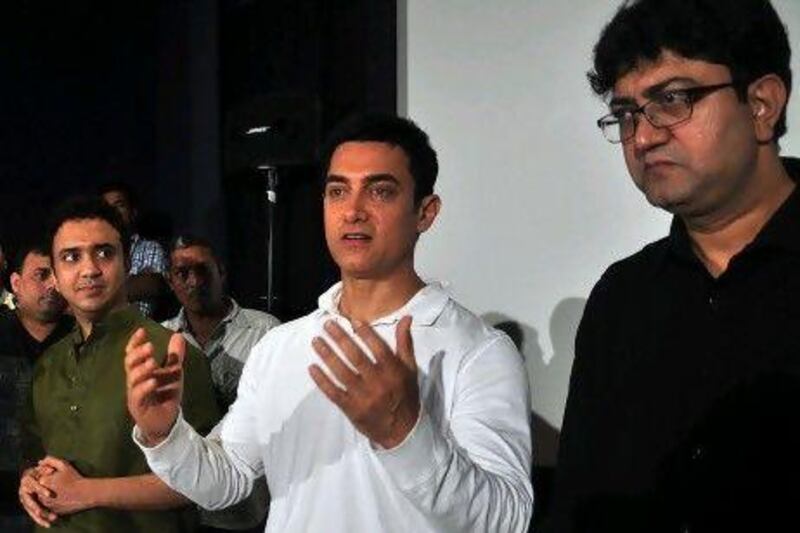NEW DELHI // Every Sunday at 11am, Nima Tamang, her husband, uncle and neighbour join hundreds of millions of fans tuning in to a new and controversial talk show hosted by Bollywood superstar Aamir Khan.
Mr Khan interviews his guests before a studio audience, in a manner reminiscent of American talk shows, leading some to dub him "the Oprah of India".
And in the style of Oprah, Satyamev Jayate (Truth Alone Prevails), tackles sensitive social issues such as medical malpractice, honour killings, child sexual abuse and female foeticide in India.
Mr Khan is often shown meeting ministers, village heads or community leaders as part of the show's research.
"I missed the first episode, so when my neighbour said this programme made her cry, I had to watch," said Ms Tamang, 24, who lives in New Delhi. "And for Aamir Khan, too, not because he is a superstar but he feels like one of us, who is talking on behalf of us."
The show debuted in May with the first of 13 episodes and struck a chord with viewers.
More than 330 million people watched the first three episodes, according to Star India, the station that airs the programme.
More than 100,000 people have called to speak to Mr Khan on the show and, according to the Television Audience Measurement, the programme to date has been watched by 8.96 million people above the age of 4.
The show is broadcast simultaneously in nine Indian languages - the first television show to do so in the country.
Despite its controversial topics, the show is broadcast on Sunday mornings - a time typically designed for family-based programming such as cartoons, or religious-based soap operas.
"The show takes notes of the desperate need for creativity and a well-researched show on Indian television," said PN Vasanti, director of the Centre for Media studies in New Delhi. "Until now you knew about these issues but you just buried them under the carpet.
"With this show, it hits you in the heart, and gently slaps you in the face, and they do it so well that you don't feel it.
"All of these are new concepts for Indian TV. This cuts across markets, TV channels, the population.
"The momentum and the interest generated takes it back to issue-based programming, which you don't really see here."
Although a number of Bollywood celebrities, from fading actresses to hot new directors, host various types of talk shows, this is the first that leaves the studio to talk to regular people.
In recent years, India TV has become dominated by local versions of western-influenced reality shows, including singing contests, quiz shows and reality shows.
Satyamev Jayate is different as it is a distinctly Indian creation but emulates its western counterparts by tackling issues head on, said Ms Vasanti.
She added that she was impressed by the debut episode that focused on female foeticide. For the first time on Indian television, young mothers spoke out about being forced to abort their unborn baby girls. The show stunned viewers.
In that episode, Mr Khanalso urged the government of Rajasthan, which has one of the worst male-to-female ratios, to take a hard look at the problem.
Rajasthan has 883 girls in the 0-6 age group for 1,000 boys, according to the 2011 census, dropping from 909 in 2001. A normal male-to-female ratio is around 980 girls for every 1,000 boys.
The episode prompted a lot of hand-wringing by the authorities in Rajasthan.
Randheer Singh, a village leader in Budania, 200 kilometres from Jaipur, the capital city of Rajasthan, said the show led him to take action against families and communities that encouraged sex determination tests of the unborn foetus.
After watching the show "I felt that awareness in Rajasthan is not enough", said Mr Singh. "Checking female foeticide at the village level is necessary to save the girl child."
The show has courted controversy. An episode that highlighted the plight of the victims of medical malpractice has the medical community up in arms.
At first the Indian Medical Association (IMA) planned to sue, then it demanded an apology.
Mr Khan refused to back down.
"I am very comfortable if they plan to take legal action if they feel that I have done something wrong. Of course, the courts are available for them. My answer is no, I will not be apologising," Mr Khan told a local television channel.
"Why should he apologise when he helps us with our burdens?" asked Ms Tamang, who, after an episode aired about child abuse, sat and talked to her husband, uncle and neighbour about an incident that had happened to her when she was 8.
She was on her way back from school when one of her neighbours tried to sexually molest her.
She broke free and ran to tell her mother who, carrying a dagger, threatened the man till he fell at her feet and apologised. Ms Tamang was never harassed again.
"I would have never been able to acknowledge what a great deed my mother did to protect me if it wasn't for this show," Ms Tamang said. "I understand the issue now."
[ sbhattacharya@thenational.ae ]
* With additional files from IANS
Follow
The National
on
[ @TheNationalUAE ]
& Surya Bhattacharya on
[ @SuryatapaB ]





